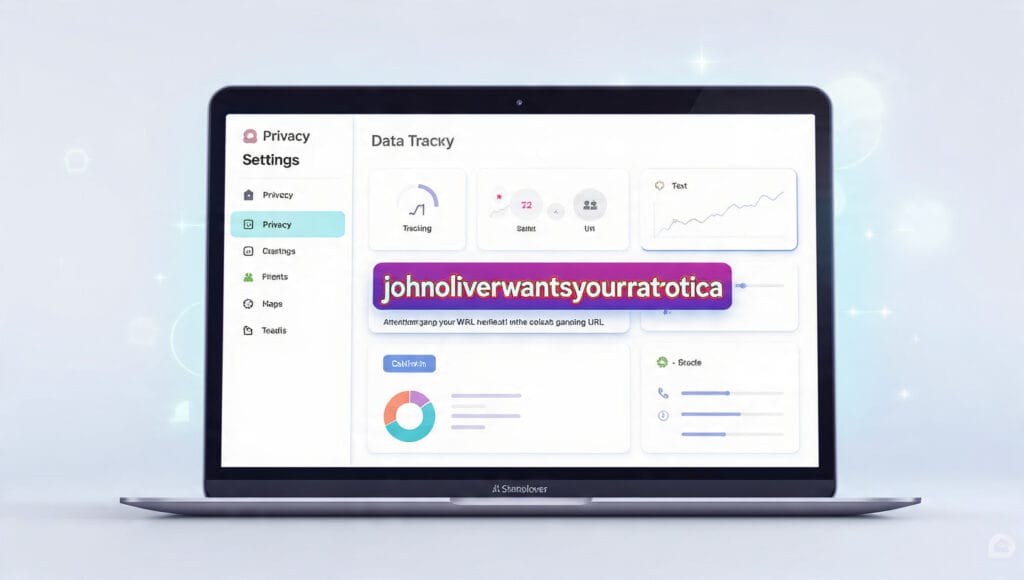The first time most people saw johnoliverwantsyourratrotica, they reacted the same way—head tilt, confused laugh, maybe even a double-take. And honestly, that was the whole point. John Oliver has always had a talent for blending humor with heavy topics, and this time, he aimed his spotlight directly at something most people scroll past without thinking twice: Meta’s aggressive ad-targeting and user data practices.
The URL looks chaotic on purpose. It doesn’t hint at tech, privacy, or Facebook at all. But click it once, and you’re met with something surprisingly serious: a clear guide on how to stop Meta from chewing through your personal data like it owns it.
Let’s break down what this campaign really is—and why it became such a conversation starter.
The Real Story Behind johnoliverwantsyourratrotica
When Last Week Tonight with John Oliver wants to make a point, it doesn’t whisper. It shouts with the weirdest, most unforgettable phrase it can legally buy as a domain name. This time, that phrase was johnoliverwantsyourratrotica.
Under the comedy, though, the message is sharp:
Meta (Facebook) collects a massive amount of personal data—far more than the average user realizes—and uses it to power targeted advertising that follows people across apps, devices, and even offline behavior.
Instead of releasing another dry “privacy awareness” site that no one would ever share, the show created something people couldn’t ignore.
Why This Campaign Matters
Meta’s data collection isn’t exactly a secret, but it’s also not something users fully understand. Most people assume it’s just “likes” or “interests.” In reality, Meta builds detailed profiles based on:
- your browsing habits
- your location history
- what you buy
- what you talk about
- what pages you view, even off Facebook
- your behavior patterns across the web
It’s unsettling when you dig into it. John Oliver’s team knew that, and they wanted a way to get regular users to pay attention. So instead of handing people a boring privacy guide, they handed them… “ratrotica.”
It worked.
What the Website Actually Teaches
Once you look past the absurd name, the johnoliverwantsyourratrotica website is incredibly straightforward. It walks you through step-by-step instructions on:
- How to limit the personal information Meta uses for ads
- How to turn off activity tracking
- How to restrict “off-Facebook” tracking
- How to stop Meta from selling your data profile to advertisers
- What tools you can use to protect your digital footprint
The instructions are simple enough for anyone to follow—even people who never fiddle with privacy settings.
John Oliver’s Strategy: Humor as a Weapon
John Oliver has a pattern: pick a complex, often frustrating problem and destroy its boring reputation with humor so sharp that people start paying attention without even meaning to.
Whether it’s net neutrality, coal industry propaganda, data brokers, or now Meta’s ad-targeting, he uses comedy as a Trojan horse.
You click for the joke.
You stay for the wake-up call.
johnoliverwantsyourratrotica follows that exact formula. The phrase is ridiculous, intentionally awkward, and impossible to forget. But the inside is pure education.
The Online Reaction
What surprised people wasn’t just the joke—it was how informative the site actually is. You’ll see reactions like:
- “I came for the chaos, stayed to fix my privacy settings.”
- “John Oliver tricked me into becoming a responsible digital adult.”
- “Meta has been tracking THAT much?!”
Even tech reviewers and privacy experts praised the site for being more accessible than most official resources.
And yes, the bizarre name helped it go viral faster than any normal PSA ever could.
Does the Campaign Actually Help Users Protect Their Data?
Absolutely. After going through the steps on the website, users can dramatically reduce:
- the number of targeted ads they receive
- the amount of personal data Meta collects
- how much advertisers know about their habits
- cross-platform tracking
It doesn’t make you invisible—but it gives you far more control.
In the digital world, that’s a win.
Why This Campaign Stands Out in the Tech Privacy Space
Tech companies often rely on complicated jargon to explain privacy settings. Most people get overwhelmed and simply give up.
John Oliver did the opposite:
- No jargon
- No complicated instructions
- No boring landing page
Just a chaotic name that makes you laugh and a guide that makes you think.
That combination is exactly why johnoliverwantsyourratrotica spread faster than any typical privacy campaign.
Final Thoughts
The genius of the campaign is simple:
Make people laugh so they’ll stay long enough to learn something important.
Behind the absurd title sits a serious message about taking control of your digital life, understanding what companies like Meta collect, and making smarter choices about online privacy.


